- Home
- Kristin Cashore
Bitterblue skt-3 Page 13
Bitterblue skt-3 Read online
Page 13
"Of course they didn't," he said with a long-suffering sigh. "Don't be daft, Sparks. Pirates murder and rape, and sink ships. Is that what you think of me?"
"Oh, you make me crazy," Bitterblue said tartly. "The lot of you sneak around thieving and getting knifed, except for when you're writing abstract books or printing Lienid-knows-what in your printing shop. You tell me nothing and then you get all huffy when I try to understand it on my own."
Saf turned away from the docks into a dark street Bitterblue didn't know. Near the entrance to what was obviously a story room, he faced her, grinning in the darkness.
"I've done a bit of treasure hunting," he said.
"Treasure hunting?"
"But I've never been a pirate, and never would, as I like to think you'd know without me having to tell you, Sparks."
"What is treasure hunting?"
"Well, ships go down, you know. They're wrecked in storms, or they burn, or they founder. Treasure hunters come later and dive to the floor of the sea, looking for treasure to salvage from the wreck."
Bitterblue studied his battered face. His conversation was amiable enough; fond, even. He liked to talk to her. But he had not lost any of his earlier anger. Something hard and hurt sat in his eyes, and he held his injured arm close to his body.
This sailor, treasure hunter, thief—whatever he was—should be in a warm, dry bed tonight, recovering his health and his temper. Not thieving, or treasure hunting, or whatever he'd come out here to do.
"It sounds dangerous," she said with a sigh.
"It is," he said. "But it's not illegal. Now, come inside. You're going to like what I steal tonight." Swinging the door open, he gestured her into the yellow light and the steam, the smell of bodies and musty wool, and a low-throated rasp that pulled Bitterblue forward: the voice of a fabler.
ON THE COUNTERS and tables of this story room, pots and buckets pinged with a tinny rhythm of falling drops. Bitterblue shot a dubious glance at the ceiling and kept to the edges of the room.
The fabler was a squat woman with a deep, melodious voice. The story was one of Leck's old animal tales: a boy in a boat on a frozen river. A fuchsia bird of prey with silver claws like anchor hooks—a gorgeous, mesmerizing, vicious creature. Bitterblue hated the story. She remembered Leck telling it to her, or one very similar. She could almost see Leck right there on the bar, one eye covered, the other gray, keen, and careful.
An image flickered then and flashed bright: the terrible wreck of the eye behind Leck's eye patch.
"Come on, let's go," Saf was saying. "Sparks. I'm done here. Let's go."
Bitterblue didn't hear him. Leck had removed the patch for her, just once, laughing, saying something about a horse that had reared and kicked him. She had seen the globe of his eyeball swollen purple with blood and had thought that the vivid crimson of the pupil was a bloodstain, not a clue to the truth of everything. A clue that explained why she felt so plodding and stupid and forgetful so much of the time—especially every time she sat with him, wanting to show off how well she read, hoping to please him.
Saf took hold of her wrist and tried to tug her away. Suddenly she was awake, galvanized. She swung out at him but he grabbed that wrist too, held her in a double grip, and muttered low, "Sparks, don't fight me here. Wait till we're outside. Let's go."
When had the room gotten so crowded and hot? A man sidling too close to her said in a voice too smooth, "Is this golden fellow giving you a hard time, boy? Do you need a friend?"
Saf spun on the man with a growl. The man backed away, hands raised, eyebrows raised, conceding defeat, and now it was Bitterblue grabbing on to Saf as Saf pushed after the man, Bitterblue grasping Saf's injured arm intentionally to cause him pain, to turn his fury back onto her, whom she knew he would not hurt, and away from everyone else in the room, whom she was less certain about.
"None of that," she said. "Let's go."
Saf was gasping. Tears brightened his eyes. She'd hurt him more than she'd meant to, but perhaps not more than she'd needed to; and anyway, it didn't matter, because they were leaving now, pushing through the people and scrambling out into the rain.
Outside, Saf ran, turned into an alleyway, and crouched low under the shelter of an awning. Bitterblue followed him and stood above him as he cradled his arm to his chest, swearing bloody murder.
"I'm sorry," she said, when he finally seemed to be switching from words to deep breaths.
"Sparks." A few more deep breaths. "What happened in there? I lost you. You weren't hearing a word I said."
"Teddy was right," she said. "It helped you to have me to look after. And I was right too. You needed someone to look after you." Then she heard her own words and shook her head to clear it. "I really am sorry, Saf—I was somewhere else. That story transported me."
"Well," Saf said, standing carefully. "I'll show you something that'll bring you back."
"You had time to steal something?"
"Sparks, it only takes a moment."
He pulled a gold disc from his coat pocket and held it under a guttering streetlamp. When he flicked the disc open, she took the edge of his hand, adjusting the angle so that she could see what she thought she saw: a large pocket watch with a face that had not twelve, but fifteen hours, and not sixty, but fifty minutes.
"Feel like explaining this to me?"
"Oh," he said, "it was one of Leck's games. He had an artist who was brilliant with small mechanics and liked to tinker with timepieces. Leck got her to make pocket watches that divided the half day into fifteen hours, but ran through them more quickly to make up the difference. Apparently, he liked to have all the people around him talking gibberish about the time, and believing their own gibberish. 'It's half past fourteen, Lord King. Would you like your lunch?' That sort of thing."
How creepy that this should sound familiar as he said it. Not a memory, not anything specific, just a feeling that she'd always known pocket watches like these but hadn't thought them worth considering for the past eight years. "He had a perverted sense of humor," she said.
"They're popular now, in certain circles. Worth a small fortune," Saf said quietly, "but considered to be stolen property. Leck compelled the woman to build them without compensating her. Then, presumably, he murdered her, as he did most of his artists, and hoarded the watches for himself. They made their way to the black market once he died. I'm recovering them for the woman's family."
"Do they keep good time?"
"Yes, but you need to work through some tricky arithmetic to figure out the real time."
"Yes," Bitterblue said. "I suppose you could convert everything into minutes. Twelve times sixty is seven hundred twenty, and fifteen times fifty is seven hundred fifty. So our seven-hundred-twenty-minute half day equals its seven-hundred-fifty-minute half day. Let's see . . . Right now, the watch reads a time of nearly twenty-five past two. That's one hundred twenty-five total minutes, which, divided by seven hundred fifty, should equal our time in minutes divided by seven hundred twenty . . . so, seven hundred twenty times one hundred twenty-five is . . . give me a moment . . . ninety thousand . . . divided by seven hundred fifty . . . is one hundred twenty . . . which means . . . well! The numbers are quite neat, aren't they? It's just about two o'clock. I should go home."
Saf had begun to chuckle partway through this litany. When, right on cue, a distant clock tower chimed twice, he burst into laughter.
"I, for one, would find it simpler to memorize which time signifies what," Bitterblue added.
"Naturally," Saf said, still chuckling.
"What's so funny?"
"I should know by now not to be surprised by anything you say or do, shouldn't I, Sparks?"
His voice had gone gentle somehow. Teasing. They stood close, heads bent together over the watch, her fingers still holding his hand. She understood something suddenly, not with her mind, but in the air that touched her throat and made her shiver when she looked up into his bruised face.
"Ah," she said. "Good
night, Saf," then she slipped away.
11
NOTHING HAD HAPPENED. Still, the next day, she couldn't stop thinking about it. Astonishing, how much thought could be generated about nothing. Heat came upon her at the most inconvenient moments, so that she was certain everyone who looked into her eyes knew exactly what she was thinking about. It was a good thing, really, that the Council meeting was planned for that night. She needed to cool down before she went out again.
Katsa burst into her rooms far too early. "Po tells me you need sword practice," she said, then committed an outrage by pulling Bitterblue's sheets away.
"I don't even have a sword yet," Bitterblue moaned, trying to burrow back under. "They're making it."
"As if we'd be starting with anything but wooden swords. Come on! Get up! Think how satisfying it'll be to attack me with a sword."
Katsa rushed out again. For a moment, Bitterblue lay there, bemoaning all existence. Then she rolled up and out of bed, the plush red softness of the carpet swallowing her toes. Bitterblue's bedroom walls were upholstered with a fabric woven in exquisite patterns of scarlet, russet, silver, and gold. The ceiling was high, deep, and dark blue like in her sitting room, scattered with gold and scarlet stars. The tile of the bathing room shone gold through a doorway across from her. It was a room like a sunrise.
As she pulled off her shift, she caught her own reflection in the tall mirror. It stopped her. She stared at herself, suddenly thinking of two incongruous people: Danzhol, who had kissed her, and Saf.
I do not suit this dazzling room, she thought. My eyes are big and dull. My hair is heavy and my chin pointy. I'm so small that my husband won't be able to find me in the bed. And when he does, he'll discover that my breasts are uneven and I'm shaped like an eggplant.
She snorted, laughing at herself; then was suddenly close to tears, kneeling on the floor before the mirror, naked. My mother was so pretty.
Is an eggplant ever pretty?
Nothing came through the pith of her mind to answer that question.
She remembered every part of her body Danzhol had touched. How far removed his kiss had been from how she'd imagined kissing. She knew that wasn't how it was supposed to feel. She had seen Katsa and Po kissing, she'd stumbled upon them once in her own stables, one of them pushing the other against a tower of hay, and once at the end of a corridor late at night, where they'd been little more than dark shapes and glimmers of gold, making small noises, barely moving, oblivious. Plainly, they enjoyed it.
But Po and Katsa are so beautiful, Bitterblue thought. Of course they know the right way to do it.
She had an imagination, and she wasn't shy of her own body; she'd made discoveries. And she knew the mechanics of two people. Helda had explained it to her, and she was pretty sure her mother had too, a long time ago. But understanding want and understanding mechanics did not go far toward elucidating how you could invite someone else to see you, to touch you in that way.
She hoped that all the kisses of her life, and all the things beyond, would not be with lords who only wanted her money. How simple it would be if she really were a baker girl. Baker girls met kitchen boys, and no one was a lord after a queen's money, and maybe it didn't matter so much if you were plain.
She hugged herself.
Then she stood, ashamed of herself for dwelling on these things when there was so much else to worry about.
PRINCE RAFFIN, KING Randa's son and the heir to the Middluns throne, and his companion Bann were also at sword practice, not looking entirely awake.
"Lady Queen," Raffin said, bending down from great heights to place a kiss on Bitterblue's hand. "How are you?"
"I'm so glad you came," said Bitterblue. "Both of you."
"We are too," said Raffin. "Though I'm afraid we had no choice, Lady Queen. We were attacked by Nanderan enemies of the Council. Katsa convinced us we'd be safer joining her wherever she went." The yellow-haired prince then beamed down upon Bitterblue as if he hadn't a trouble in the world.
Bann, who took Bitterblue's other hand, was, like Raffin, a Council leader and medicine maker who radiated calm—a broad mountain of a man, with eyes like the gray sea. "Lady Queen," he said. "It's lovely to see you. I'm afraid they pulverized our workrooms."
"We'd spent almost a year on that nausea infusion," said Raffin grumpily. "Months of us heaving our guts up, all lost."
"I don't know, it sounds to me as if you were quite successful," said Katsa.
"It was meant to be an infusion for reducing nausea!" Raffin said. "Not inducing it. We were close, I'm sure of it."
"That last batch barely caused you to vomit at all," Bann said.
"Wait," Katsa said suspiciously. "Is this why you both vomited on me while I was rescuing you? You'd been guzzling down your own infusion? Why would anyone bother trying to kill you?" she said, throwing her hands in the air. "Why not just wait for you to kill yourselves? Here, take this," she said, shoving a wooden sword so hard against Raffin's chest that he coughed. "If I have anything to do about it, the next time someone comes across the world to kill you, you'll be ready."
Bitterblue had forgotten how good this could be: a project with straightforward, identifiable, and physical goals. An instructor whose confidence in one's ability was absolute—even when one caught one's sword in one's skirts, tripped, and fell on one's face.
"Skirts are an imbecilic invention," said Katsa, who always wore trousers and cut her hair short. Then she picked Bitterblue up and set her on her feet so quickly that Bitterblue was no longer certain she'd been lying on the floor in the first place. "I expect they were a man's idea. Don't you have any practice trousers?"
Bitterblue's single pair of practice trousers were also her midnight escape trousers and, as such, were currently muddy and soaking wet, drying as best they could on the floor of her dressing room, where she hoped Helda wouldn't find them. She supposed she could ask Helda for more trousers now, with these lessons as the excuse. "I thought I should practice in the clothing I was likely to be wearing when attacked," she improvised.
"That does make sense. Did you knock your head?" Katsa asked, smoothing Bitterblue's hair back.
"Yes," Bitterblue lied, to keep Katsa touching her.
"You're doing well," Katsa said. "You have quick instincts—you always have. Not like that nincompoop," she added, with a roll of her eyes at Raffin, who was sparring with Bann awkwardly at the other end of the practice room.
Raffin and Bann were far from evenly matched. Bann wasn't just bigger, he was faster and stronger. The cowering prince, who handled his own sword ponderously, as if it were an impediment, never seemed to see an attack coming, even if he'd been told exactly when to expect it.
"Raff," Katsa said, "your problem is that your heart's not in it. We need to find something to strengthen your defensive resolve. What if you pretended he's trying to smash your favorite medicinal plant?"
"The rare blue safflower," Bann suggested.
"Yes," Katsa said gamely, "pretend he's after your snaffler."
"Bann would never come after my rare blue safflower," Raffin said distinctly. "The very notion is absurd."
"Pretend he's not Bann. Pretend he's your father," Katsa said.
This did seem to have some effect, if not on Raffin's speed, then at least on his enthusiasm. Bitterblue focused on her own drills, soothed by the noises of productive work going on nearby, allowing herself to empty her mind. No memories, no questions, no Saf; only sword, sheath, speed, and air.
SHE WROTE A ciphered letter to Ror on the subject of remuneration and entrusted it to Thiel, who carried it gravely to his stand. It was hard to predict how long a letter would take to reach Ror City. It depended entirely on what ship carried it and on the weather. If conditions were ideal, she might look for a response in two months—the beginning of November.
In the meantime, something had to be done about Ivan in the east city. But Bitterblue couldn't claim to have learned of him through her spies as well, or her credibili
ty would begin to wear thin. Perhaps if she were allowed to roam the castle every day, then she could reasonably pretend to have overheard conversations. She could claim a broader familiarity, with everything.
"Thiel," she said, "do you think I could have one task every day that took me out of this tower? If only for a few minutes?"
"Are you restless, Lady Queen?" asked Thiel gently.
Yes, and it was also that she was distracted and far away from here, in a rainy alleyway under a guttering lamp, with a boy. Embarrassed, she touched her flushing throat. "I am," she said. "And I don't want to fight every time. You must let me do more than shuffle paper, Thiel, or I'm going to go mad."
"It's a matter of finding the time, Lady Queen, as you know. But Rood says there's a murder trial in the High Court today," added Thiel benevolently, noting the disappointment on her face. "Why don't you go to that, and we'll look for something relevant for tomorrow?"
THE ACCUSED WAS a shaking man with a history of erratic behavior and an odor that Bitterblue pretended not to notice. He had stabbed a man to death, an utter stranger, in broad daylight, for no reason he was able to explain. He had just . . . felt like it. As he made no attempt to deny the charge, he was convicted unanimously.
"Are murderers always executed?" Bitterblue asked Quall to her right.
"Yes, Lady Queen."
Bitterblue watched the guards take the shaking man away, stunned at the brevity of the trial. So little time, so little explanation needed to condemn a man to death. "Wait," she said.
The guards to either side of the shaking man stopped, turning him around to face her again. She stared at the prisoner, whose eyes rolled in his head as he tried to look at her.
He was disgusting and he'd done a horrible thing. But did no one else feel in his gut that something was wrong here?
"Before this man is executed," she said, "I should like my healer Madlen to meet with him and determine whether he's in his right mind. I don't wish to execute a person incapable of rational thought. It's not fair. And at the very least, I insist on some greater attempt at finding his reason for doing something so senseless."

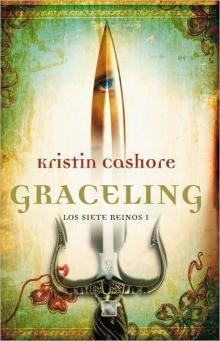 Graceling
Graceling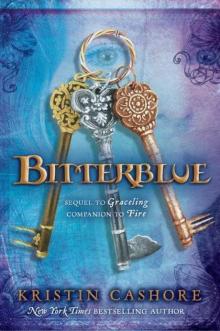 Bitterblue
Bitterblue Fire
Fire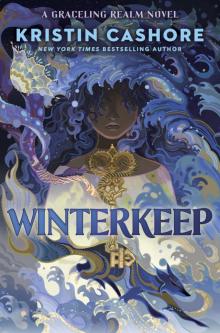 Winterkeep
Winterkeep Helen Keller in Love
Helen Keller in Love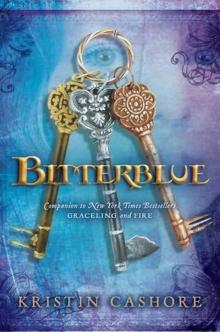 Bitterblue skt-3
Bitterblue skt-3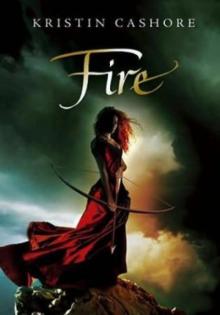 Fire skt-2
Fire skt-2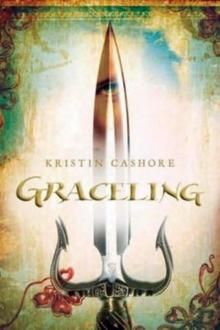 Graceling skt-1
Graceling skt-1